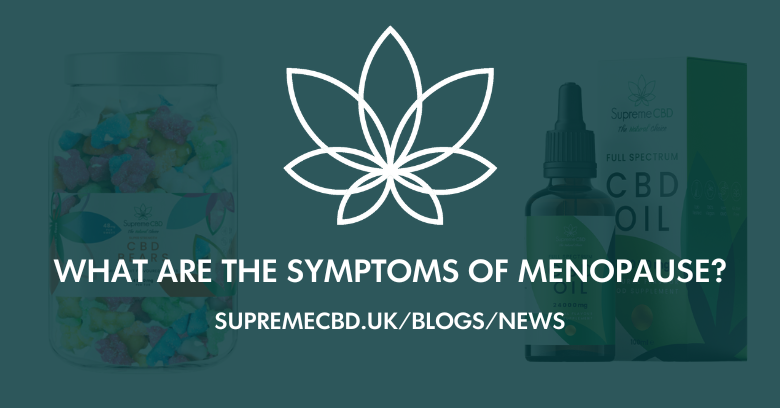
What are the symptoms of menopause?
From hot flushes to night sweats and anxiety – menopause symptoms can impact everyone differently. In this article, we take a look at some of the most common menopause symptoms.
According to NHS England, there are around 13 million women who are currently perimenopausal or menopausal in the UK. However, a survey of post-menopausal women in the UK revealed that 90% of participants said they were not educated about the menopause, and over 80% of surveyed women under 40 also said they were not educated about the menopause.
This lack of knowledge may leave many women questioning what they are experiencing when the transition begins.
Menopause effects everyone differently, and while some women are severely affected by symptoms, other women do not experience them at all.
The symptoms can have a big impact on our wellbeing, so, what are they? Let’s take a look at the menopause and some of the most commonly experienced symptoms.
What is the menopause?
The menopause is a time during a women’s life when her body begins to experience hormonal changes.
During this transition, the production of hormones that are crucial for sex, fertility and reproduction – oestrogen, progesterone and testosterone – begins to change.
The drop in levels of oestrogen is one of the main contributors to a number of menopausal symptoms.
Perimenopause vs. menopause
So, let’s take a look at the difference between perimenopause and menopause.
Perimenopause is the start of menopause when a body first begins to experience hormonal changes. This change can sometimes begin years before the end of a woman’s periods, and can last anywhere between just a few months and seven years, with the average lasting around three to four years.
The menopause is the stage where a woman’s periods end completely, and a woman becomes post-menopausal once she has not had a period for 12 months.
While these are all different stages of the transition, people commonly refer to the whole transition as “the menopause”. The menopause begins at the average age of 46 and ends at the average age of 51.
Anxiety, depression and mood swings
Mental health issues such as anxiety, depression and mood swings are common symptoms of the menopause. One study found that approximately 15% to 50% of perimenopausal and postmenopausal women may experience these types of symptoms, along with insomnia and forgetfulness.
It is thought that changes in oestrogen levels may contribute to anxiety in menopausal women, as oestrogen is linked to the production of serotonin in the brain.
Serotonin is known for regulating mood, and when these hormone levels drop, so do levels of serotonin, contributing to low mood and anxiety.
Researchers have suggested that Mindfulness-Based Stress Reduction may be a beneficial intervention for menopausal women experiencing mental and emotional symptoms. Stress may also play a role, as some research has suggested that excessive stress leads to an increase in stress hormones, which can negatively affect reproduction and accelerate the menopause.
Hot flushes and night sweats
Hot flushes and night sweats are often one of the most commonly discussed symptoms of the menopause, experienced by up to 80% of menopausal women.
Again, hot flashes and night sweats are caused by changes in hormones and can last for many years. They can have a big impact on a person’s life from interrupting sleep to reducing energy and causing low mood.
A number of measures can be taken to help ease these experiences such as maintaining a healthy diet and exercising, practicing mindfulness, wearing layers and speaking to your doctor about any available medications that may help you.
Bone loss
Oestrogen is a vital hormone for healthy bones, and its depletion during the menopause can lead to bone loss. In fact, research shows that woman could lose up to 10% of their bone mass during the menopause.
This is because oestrogen contributes to the formation of healthy bone, and its reduction during menopause contributes to this bone loss. This can increase the risk of breaking a bone as bone density is reduced. Research has shown that the use of oestrogen seems to reduce the rate of bone loss over a period of 23 years, and the longer the duration of the therapy, the less bone loss.
Reduced sex drive
Another impact of changes in hormones is reduced libido, decreases in orgasms, possible pain during intercourse and vaginal dryness.
However, mood changes related to menopause may also impact the ability to become aroused and cause problems with intimacy. As one research study explains: “Hormones affect sexual arousal through sensory perception, central as well as peripheral nerve transmission and discharge, peripheral blood flow, and capacity to develop muscle tension. Impairment of this mechanism can lead to diminished sexual responsiveness, dyspareunia, decreased sexual activity, decline in sexual desire, and sexual aversion.”
Recognising the menopause
It is important to be aware of menopausal symptoms so you know when to speak to a doctor, and as, for some women, menopause can begin earlier than expected.
There are a number of treatments and medications that can be utilised to help manage symptoms of the menopause including Hormone Replacement Therapy (HRT), oestrogen creams, mood medications and cognitive or talking therapies.
A healthy and balanced lifestyle that incorporates exercise and nutrition is also vital for maintaining optimal health during the transition.
If you think you are experiencing symptoms of the menopause, speak to your medical health professional.